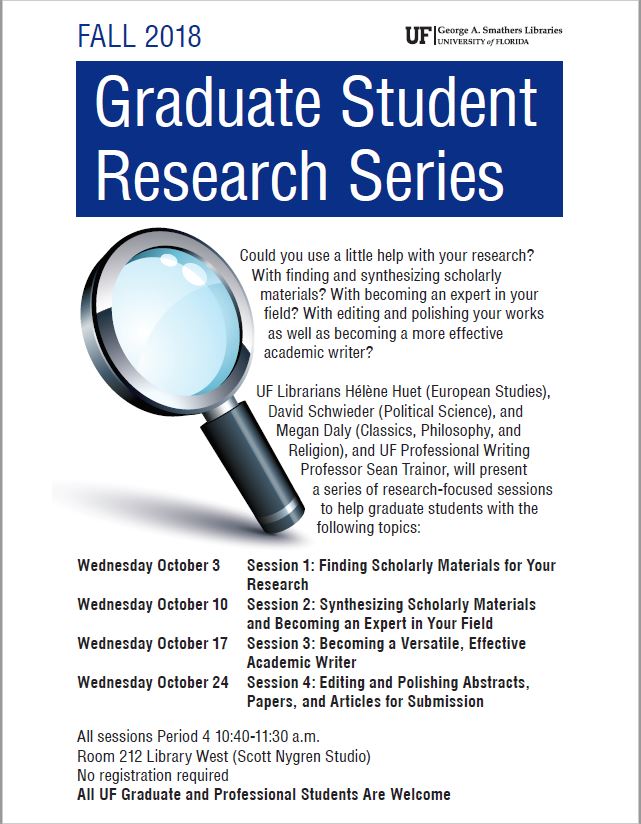POSITION VACANCY ANNOUNCEMENT
POSITION: Anthropology Librarian
RANK: Assistant University Librarian or Associate University Librarian
REPORTS TO: Associate Chair, Humanities & Social Sciences Library (Library West)
SALARY: Minimum salary at the Assistant University Librarian rank is $54,035
Minimum salary at the Associate University Librarian rank is $62,500
Actual salary will reflect selected professional’s experience and credentials
REQUISITION #: 43739
DEADLINE DATE: March 29, 2019 – applications will be reviewed as received.
Please note: this posting has specific instructions for the submission of application materials. Failure to submit required documents may result in the application not being considered.
JOB SUMMARY
The Anthropology Librarian is a year-round (12 month) tenure track library faculty position responsible for the overall development, management and coordination of the George A. Smathers Libraries resources in all formats for archaeology, and biological, cultural and linguistic anthropology. The position supports the University’s academic programs including the Department of Anthropology as well as interdisciplinary programs supported by the College of Liberal Arts and Sciences. Responsibilities include analyzing the University’s programs in anthropology, collaborating with librarians and academic faculty to establish collection profiles, selection guidelines, and preservation, location and cataloging priorities; and evaluating existing collection strengths and current collecting intensities. Collaborates with other employees to provide support in the broader area of the social sciences, especially interdisciplinary areas. This position manages specialized subject area reference services, library instruction, and online database services.
The Smathers Libraries encourage staff participation in reaching management decisions and consequently the Anthropology Librarian will serve on various committees and teams. To support all students and faculty, and foster excellence in a diverse and collaborative society, the Libraries are actively seeking candidates who bring culturally-rich lived experiences to work with individuals of diverse backgrounds, experiences, races, ethnicities, genders, gender identities, sexual orientation, and perspectives. The Smathers Libraries recently created a new strategic direction focused on ensuring that the Libraries are a safe, supportive and welcoming learning environment for all users and on focusing engagement efforts to diverse populations within the University and local community. The Anthropology Librarian will pursue professional development opportunities, including research, publication, and professional service activities in order to meet library-wide criteria for tenure and promotion.
RESPONSIBILITIES:
– Develops relationships with appropriate academic faculty, including those in the Department of Anthropology and interdisciplinary programs supported by the College of Liberal Arts and Sciences.
– Keeps informed of the development of academic programs and faculty interests to ensure that the Libraries’ collections and services support curriculum and research needs, and informs clientele about relevant Libraries’ issues.
– Responsible for advanced reference and research consultation in support of anthropological studies, including the development of LibGuides and other online resources.
– Defines goals, establishes objectives, plans and manages budgets, and coordinates collection development activities with other subject specialists, and librarians, with respect to resources for the anthropological studies, and related collections.
– Analyzes the anthropology collection development program and activities and provides reports, strategies, assessments, and studies or surveys as required. Participates in the Humanities and Social Sciences general reference program.
– Participates in outreach and instruction programs using traditional classroom and active learning methods and innovative educational technologies.
– Supports diversity, equity and inclusion efforts as part of the Libraries Strategic Directions.
– Participates in appropriate professional development and continuing education endeavors and engages in scholarly service and research resulting in publication.
– Liaises and collaborates with faculty, students, researchers and other departments to further library scholarship initiatives and partnerships.
-Performs scholarly research and provides service at the institutional and professional levels as related to assignment and in accordance with tenure and promotion criteria
– Participates in Library fundraising efforts and grant projects.
QUALIFICATIONS:
Required:
– Master’s degree in Library or Information Science from an ALA-accredited program, or other relevant advanced degree in subject specialty with a minimum of two years of library work experience.
– For appointment at the Associate University Librarian rank, eight years of relevant experience
– Familiarity with scholarly literature of anthropology.
– Excellent analytical and organizational skills.
– Ability to work both independently and collaboratively with faculty, students, administrators, and the general public.
– Excellent verbal and written communication skills as well as effective presentation skills.
– Commitment to including individuals of diverse backgrounds, experiences, races, ethnicities, gender identities, sexual orientation, and perspectives in research, teaching, service and other work.
– Initiative, flexibility and the ability to adapt to a complex, rapidly changing academic environment.
– Competence with information technologies and demonstrated effectiveness in integrating technology with traditional services and resources.
– Competence with office technology and willingness to learn new technology.
– Strong potential for meeting the requirements of tenure and promotion.
Preferred:
– Advanced degree in anthropology or related field.
– Undergraduate degree in anthropology or other relevant discipline, or extensive work experience in a relevant subject area.
– Experience providing reference and/or instructional services related to anthropology and social sciences in an academic or research library environment.
– Sound knowledge of collection management, reference, and instructional practices and standards.
– Experience in evaluating print and online resources.
– Experience managing collections in an academic or research library.
– Proficient in the creation of web pages and web based materials
– Experience in digital scholarship and data curation.
THE UNIVERSITY OF FLORIDA
The University of Florida (UF) is a major, public, comprehensive, land-grant, research university. The state’s oldest and most comprehensive university, UF is among the nation’s most academically diverse public universities and won the 2018 Senator Paul Simon Award for Comprehensive Internationalization.
UF was ranked 9th among public universities in Forbes’ “America’s Best Employers 2015” and 8th among “Top Public Schools” in U.S. News and World in 2018. UF has a long history of established programs in
international education, research and service. In 2013 the Florida Legislature designated UF as the state’s preeminent institution which grew into an opportunity to achieve national and international recognition for
the University’s work in serving students and the world. It is one of only 17 public, land-grant universities that belong to the Association of American Universities. UF traces its beginnings to a small seminary in 1853 and is now one of the largest universities in the nation, with more than 50,000 students. For more information, please consult the UF homepage at http://www.ufl.edu.
UNIVERSITY OF FLORIDA LIBRARIES
The libraries of the University of Florida form the largest information resource system in the state of Florida. The UF Libraries consist of seven libraries on the Gainesville campus and three off-campus facilities; six of the campus libraries, and all of the off-site facilities, are in the system known as the George A. Smathers Libraries at the University of Florida. The remaining library is the Lawton Chiles Legal Information Center. Collectively, the UF Libraries (the Smathers Libraries and the Legal
Information Center) hold or provide access to over 6 million print volumes, 8.1 million microfilms, 1.5 million e-books, over 145,000 full-text electronic journals, 827 electronic databases, 1.3 million documents and 1.4 million maps and images. The UF Libraries have built a number of nationally significant research collections, including the Latin American, Judaica, Florida History, Children’s Literature, and Maps and Imagery collections. The UF Libraries are a member of the Association of Research Libraries (ARL), the Center for Research Libraries (CRL), and the Association of Southeastern Research Libraries (ASERL). The library staff consists of
more than 300 FTE librarians, technical/clerical staff and student assistants. The organizational chart is available at http://www.uflib.ufl.edu/orgchart.pdf.
The George A. Smathers Libraries are strong advocates for inclusion and intellectual freedom. The Libraries’ commitment to both is articulated in the Inclusion Statement and Intellectual Freedom Statement, both of which are posted at http://cms.uflib.ufl.edu/InclusionAndIntellectualFreedom.
HUMANITIES AND SOCIAL SCIENCES LIBRARY (Library West)
The Humanities and Social Sciences Library (Library West) is the largest branch library on the UF campus, with 17 faculty and 13 staff members, seating for 1,600 patrons, and 217 public computers, including iPads and other circulating technologies. Last year, Library West received over 1.2 million visitors. Renovated in 2006, the branch offers 18 group study rooms, a student video production space, faculty and graduate carrels as well as a limited-access floor for graduate students. One classroom is available with 19 computers for hands-on instruction. The Scott Nygren Digital Scholars Studio is a flexible space that allows seats to be arranged for individual or group projects, or auditorium style for presentations/workshops. Within the branch, there are four functional units: Research Assistance, Instruction and Outreach, Collections, and Circulation; these units are managed by coordinators who oversee the daily functions. See the organizational chart for current structure of the department.
COMMUNITY
Gainesville, Florida and the surrounding community are home to approximately 257,000 people and both the University of Florida and Santa Fe College. Situated just over an hour from the Gulf of Mexico and the
Atlantic Ocean, the city is surrounded by over 40 nature parks, including many spring-fed lakes and rivers.
In 2015, Gainesville was named the “Best Midsize College City in America” by WalletHub and ranked no.7 on Livability.com “Top 10 College Towns.” Gainesville is known as an innovative municipal government and an innovative city. Gainesville continues to receive national recognition as a top-rated city. Some of Gainesville’s accolades are listed at the Gainesville Awards and Recognition link. The Guide to Greater Gainesville combines award winning photography and compelling articles that capture all of the reasons for calling Greater Gainesville your next home. The area has numerous cultural institutions and is a haven for sports fans. Jacksonville, Orlando, Tampa, Tallahassee, and St. Augustine are all within a two-hour drive. Gainesville is an affordable city and area to live in – using a cost of living calculator you can compare cities across the United States. See how affordable Gainesville really is.
BENEFITS
Vacation days, paid holidays, and sick leave days; retirement plan options; insurance benefits; tuition fee waiver program; no state or local income tax. Prospective employees should review the information about employment and benefits at UF available at http://hr.ufl.edu/benefits/. UF offers a comprehensive new online benefits tool called ALEX to help employees and prospective employees review benefit choices at UF.
APPLICATION PROCESS
To apply, submit 1) a cover letter detailing your interest in and qualifications for this position; 2) a written essay on this topic (in 250 words or less) “As the Anthropology Librarian, how would you reach out to students and faculty to promote library programs and services?”; 3) your current resume or CV; and 4) a list of three references including their contact information (address, telephone number, and email). Apply by March 29, 2019 (applications will be reviewed as received). Submit all application materials through the Jobs at UF online application system at Requisition 43739. Failure to submit the required documents may result in the application not being considered. If you have any questions or concerns about this process please contact Bonnie Smith, George A. Smathers Libraries Human Resources Office, at bonniesmith@ufl.edu.
Final candidate will be required to provide official transcript to the hiring department upon hire. A transcript will not be considered “official” if a designation of “Issued to Student” is visible. Degrees earned from an education institution outside of the United States are required to be evaluated by a professional credentialing service provider approved by National Association of Credential Evaluation Services (NACES), which can be found at http://www.naces.org/.
AFFIRMATIVE ACTION/EEO
The University of Florida is an Affirmative Action, Equal Opportunity Employer and encourages applications from women and minority group members. We are dedicated to the goal of building a culturally diverse and pluralistic environment; we strongly encourage applications from women, members of underrepresented groups, individuals with disabilities, and veterans. As part of the application process, applicants are invited to complete an on-line confidential and voluntary demographic self-disclosure form. This information is collected by the University of Florida’s Office of Human Resources to track applicant trends and is in no way considered by the Smathers Libraries in the selection process.


